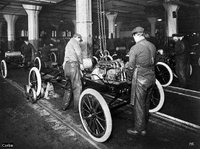I was a bit perplexed by the original post in that you argued, understandably, that Weil was attempting to hegemonize the power relations within the factory, by making the workers give their reasoned consent to the production process, through greater knowledge of its overall purpose and greater involvement in decision-making as a result. At the same time, however, you see in Weil a precursor of today's "take your kid to work" day, complete subsumption, affective labour etc., which, if I've understood you, you take to be characteristic of posthegemony, of the end of any hegemonic relation. So by instituting hegemonic relations Weil brings them to an end and heralds posthegemony. . . I don't quite get this.
For me, a possible answer to this apparent contradiction lies in the detail of what Weil is actually proposing, since I read this slightly differently from you, as follows:
Yes, it's certainly true that Weil bemoans the brutalising and debasing nature of factory work, arguing for the need for workers to have a rational grasp of what they're doing by being made aware of the purpose (the use value) of the components they produce. However, this is only one part of the story.
For all her criticisms of the dehumanising realities of factory labour, Weil is not entirely insensitive to the "moments d'euphorie [moments of euphoria]" that factory work affords her (Weil 1951, 52), to what she terms "une certaine joie de l'effort musculaire [a certain joy in physical effort]" (76). In a kind of dialectic of euphoria and debasement, the joy Weil derives from her labours relates directly to way in which the repetitive rhythms of factory work "brutalise" workers by reducing them to a more primitive, animalistic state, to the state of unthinking beasts of burden. As she puts it in one of her diary entries: "7h-10h40: continué * rythme rapide, malgré malaise. Effort, mais aussi après quelque temps sorte de bonheur machinal, plutôt avilissant [7am-10.40am: continued * rapid rate, despite unease. Effort, but also after a while a sort of machine-like happiness, more or less debasing]" (61).
 Thus, even in Weil's account of the working conditions in a Fordist factory, the apparently unnatural rhythms of modern factory labour are taken to reduce or return the worker to a more primitive state that, although debasing or "avilissant"--or rather, precisely because it is "avilissant"--elicits a strange "bonheur machinal."
Thus, even in Weil's account of the working conditions in a Fordist factory, the apparently unnatural rhythms of modern factory labour are taken to reduce or return the worker to a more primitive state that, although debasing or "avilissant"--or rather, precisely because it is "avilissant"--elicits a strange "bonheur machinal."In her suggestions for the reform of working conditions in French factories, Weil proposes to mitigate the brutalising, debasing effects of routinised factory labour by increasing the extent to which workers are made aware of the purpose of their efforts, reconnected with the products of their labours, at least intellectually, and hence included in the decision-making process.
However, this strengthening of reason and intellect in the face of the debasement of purely physical labour does not imply rejecting outright the "joy", "euphoria", or "happiness" Weil experienced through submitting herself to Fordism's repetitive rhythms. Rather, as she puts it, "la condition d'un bonheur plein [the precondition for complete happiness]" in the factory is the achievement of a harmonious "union entre un ouvrier et sa machine [union between a worker and her machine]," since it this union alone that "fait du travail un équivalent de l'art [makes of work an equivalent of art]" (168).
Weil's suggestion reflects what appears to be an adherence to a Kantian conception of art and the aesthetic. As Terry Eagleton has explained, for Kant the aesthetic offers a way of mediating between the realms of pure sensuality and disembodied intellect, representing "an elusive third way between the vagaries of subjective feeling and the bloodless rigour of the understanding" (The Ideology of the Aesthetic 17). As such, the aesthetic holds out the promise of healing "the fissure between abstract duty and pleasurable inclination" (20).
In Weil's proposed reforms of working conditions, then, the initially disruptive, debasing rhythms of factory labour will, when leavened with an increased emphasis on the intellectual component of labour, ultimately prove essential to a harmonious working experience, in which abstract duty, in the form of the orders of the time and motion man, and pleasurable inclination, the "bonheur machinal", will be reconciled.
It is because of its ability to heal the fissure between abstract duty and pleasurable inclination that Eagleton attributes a particular role to the aesthetic in bourgeois ideology:
The ultimate binding force of the bourgeois social order, in contrast to the coercive apparatus of absolutism, will be habits, pieties, sentiments, and affections. And this is equivalent to saying that power in such an order has become aestheticized. It is at one with the body's spontaneous impulses, entwined with sensibility and the affections, lived out in unreflective custom. Power is now inscribed in the minutiae of subjective experience, and the fissure between abstract duty and pleasurable inclination is accordingly healed. To dissolve the law to custom, to sheer unthinking habit, is to identify it with the human subject's own pleasurable well-being, so that to transgress the law would signify a deep self-violation. The new subject, which bestows on itself self-referentially a law at one with its immediate experience, finding its freedom in its necessity, is modelled on the aesthetic artefact. (20)Now, isn't this precisely a definition of the functioning of habitus in Bourdieu, of the "amor fati", of the way objective necessity (working class kids don't go to university) becomes internalised, allied with subjective inclination, so that to even imagine going to university becomes "a deep self-violation" of the collective ethos ("who do you think you are?").
The habitus, after all, generates "actions which are reasonable without being the product of reasoned design [. . .] informed by a kind of objective finality without being consciously organized in relation to an explicitly constituted end" (Logic of Practice 50-51). In other words, practice is endowed with the very "purposefulness without purpose" that defines the Kantian aesthetic object. Hence Bourdieu can describe practice in unmistakably aesthetic terms as containing "something ineffable, something [. . .] which pleases (or displeases) without concepts" (Outline 1-2). Hence also Bourdieu's constant recourse to poetic and musical motifs to communicate how practice and habitus function: Bachelard's Poetics of Space, Mallarme's poem "Le Demon de l'analogie" as title of the final chapter of The Logic of Practice, allusions to musical improvisation, Kabyle habitus endowed with "the eternal charm of Greek art, of which Marx spoke," and so on.
 To return to Weil, then, and to shifting relations of power and forms of sovereignty. . . Consider Bourdieu's narrative of a shift from the "gentle" forms of domination under pre-capitalism ("disinterested" gift exchange, relations of fealty and honour) to outright coercion (the brutal conditions Weil experiences in the factory) followed by a "return" to a modernised version of those earlier "gentle" forms of domination. Wouldn't this be useful here?
To return to Weil, then, and to shifting relations of power and forms of sovereignty. . . Consider Bourdieu's narrative of a shift from the "gentle" forms of domination under pre-capitalism ("disinterested" gift exchange, relations of fealty and honour) to outright coercion (the brutal conditions Weil experiences in the factory) followed by a "return" to a modernised version of those earlier "gentle" forms of domination. Wouldn't this be useful here? (Bourdieu's is, of course, an inflection and extension of Marx's description of the shift from feudalism, with its relations of fealty, loyalty, and personal honour between lord and serf, to the "naked exploitation" of capitalist relations: viz. both The Communist Manifesto and the 1844 Manuscripts.)
If we apply Bourdieu's narrative to this case, then we get not the institution of hegemony which, paradoxically, leads to posthegemony. Rather we get the institution of an aestheticized relation of power, which mediates between reasoned consent and let's call it affect or sensibility, yes by involving a greater dose of intellect or reason, but not by that alone and hence anticipating our current world of affective labour, "take your kid to work," and so on. This seems to me to get you out of the problem I identified at the beginning, of seeing posthegemony as being created by hegemony.
This has been a guest post from Jeremy.
No comments:
Post a Comment